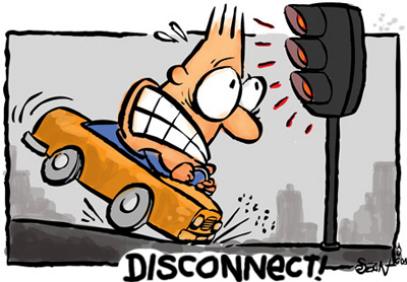Imagine you were reading a mystery novel. You’ve just finished five pages. The story line is becoming really interesting.
And then you turn the page
And find the sixth page has been torn out. Now that’s really irritating, eh?
But let’s suppose you decide to continue reading anyway
And you move to page seven, and pick up the thread of the story. And you’re reading page eight, page nine, page ten.
And page eleven is torn out. At this point, you’re more than frustrated.
And this is the feeling that many readers have when they read your article.
It’s because you’re not planning your disconnectors.
So what are disconnectors?
Disconnectors can be simply described as a sudden stop.
So let’s say you’re telling a story.
Or telling a joke.
Or singing a song.
A sudden stop in the middle of your story/joke/song would be a disconnector.
But a disconnector isn’t a bad thing, provided you understand the difference between a planned and an unplanned disconnector.
Planned Disconnectors.
Planned Disconnectors are what you see on any TV serial. You’re watching this villain chasing the hero. The tension builds up. And it reaches a crescendo.
And the scene changes to something else. Like a scene at the beach. What you’ve just experienced is a disconnection. One moment you’re watching a crazy chase. Next moment the waves are lapping on the sand.
And this experience is a planned disconnector.
But how do we know it’s a planned disconnector?
Because the villain and the hero will show up again in the same serial. Which means the thread of the serial is to disconnect, then connect, then disconnect.
And this planned disconnector allows us to pick up the thread of the serial.
But what of unplanned disconnectors?
Unplanned disconnectors are simply a factor of too many thoughts. Imagine that same villain chasing the hero. And you don’t see the scene again.
The scene doesn’t re-connect at all. So you’re left with half a story.
And that’s frustrating
Because the reason you were reading the story, was because you were interested.
If the story suddenly ‘disappears’, you’ve created a disconnect. The reader may tolerate the disconnect, as long as you bring up the connection later in the article.
So let’s see an example:
Peter worked for few years as a volunteer in a little village in Peru. He really enjoyed his work and felt he was doing something useful. Eventually he moved back to his own country, and got a job.
35 years later, his professional life came to an end, as he had reached the mandatory 62 years retirement age. His volunteer Peruvian years came back nagging him more and more.
What happened to the people he had lived with 35 years earlier? What became of the village? In the case of Peter, his time was filled with questions about the people and the village in Peru.
It was difficult for him to focus on other activities. He eventually went to Peru.
Martha felt that retirement age came to early. She still had things she wanted to do professionally. She resented seeing her years of professional experience as a bank manager almost being cancelled by the fact she reached retirement age.
She felt drained of all her energy. She felt tired right in the morning when she woke up.
See what happened in the story above?
You got into the story of Peter and Peru. But the story suddenly disconnected. And went on to Martha.
Now as you read further, you’d expect the writer to bring back the connection. To complete the Peter in Peru story, as it were.
But most article-writers never bring back the connection
They’re so eager to move to the next idea, that they fail to
complete the first.
They’re onto the next idea. The next paragraph. The next piece of information.
And the reader is now totally confused. But reads on any way.
But isn’t that the point of the article – get the reader to read on anyway?
Yes, it is. As we’ve found, disconnectors provide an intense lift in drama. Or a drop in drama. But if the reader continues to find disconnects, and there’s no connection, the reader feels cheated.
They feel like they’ve read to page five. And then page six is gone.
And then continued to page ten. And page eleven is gone.
This unplanned disconnect leaves an incomplete, icky feeling.
And it’s not what you set out to do
So either complete your story in the greatest detail (No, you don’t have to create disconnectors at all).

















